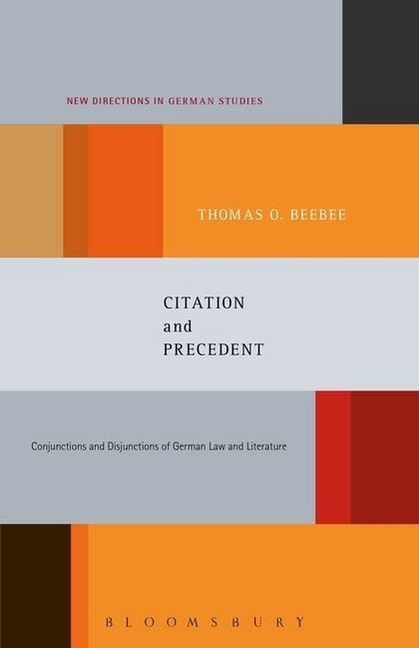Read more
Among Western literatures, only the German-speaking countries can boast a list of world-class writers such as Goethe, Hoffmann, Kleist, Kafka, Schmitt, and Schlink who were trained as legal scholars. Yet this list only hints at the complex interactions between German law and literature. It can be supplemented, for example, with the unique interventions of the legal system into literature, ranging from attempts to save literature from the tidal wave of Schund (pulp fiction) in the early twentieth century to audiences suing theaters over the improper production of classics in the twenty-first. The long list of instances where German literature cites law, or where German law serves literature as a precedent, signal the dream of German culture of a unity of interests and objectives between spheres of activity. Yet the very vitality of this dream stems from real historical and social processes that increasingly autonomize and separate these domains from each other.Beebee examines the history of this dialectical tension through close readings of numerous cases in the modern era, ranging from Grimm to Schmitt.>
List of contents
Acknowledgments
1.1 Introduction
1.2 Subsystem or Public Sphere?
2.1 In Search of the Invisible Precedent: Grimm Writes to Savigny
2.2 Kant, Codification, and Goethe's Elective Affinities
3.1 A Recursive Process: Kafka's Law - and Ours
3.2 Walter Benjamin reads the Weimar Constitution
3.3 From Schiller to Schund: Zensur and the Canonization of Literature
3.4 German Literature Fights for its Rights: A Thick Description of an Incident of Weimar Literary Culture
4.1 Carl Schmitt and/as Benito Cereno
4.2 Citation as Second-Order Observation: Peter Weiss's The Investigation
Conclusion
Works Cited
About the author
Thomas O. Beebee is Distinguished Professor of Comparative Literature and German, Penn State University, USA. He is the author of Millennial Literatures of the Americas, 1492-2002 (2008), Epistolary Fiction in Europe (1999), The Ideology of Genre: A Comparative Study of Generic Instability (1994) and Clarissa on the Continent: Translation and Seduction (1990).
Report
"Kafka, Benjamin, Schmitt-that German-speaking writers and thinkers of the early 20th century are obsessed with 'the law' is well-known. Citation and Precedent widens our historical and conceptual perspective. Beebee reconstructs not only a dense intertextual network of law, literature, and philosophy that pervades German culture from Kant to Peter Weiss; he also shows that these crossings and borrowings are driven by the dream, or the nightmare, of a 'culture' capable of uniting law and life, codified norm and everyday reality. This is an excellent book." -- Andreas Gailus, Associate Professor of German, University of Michigan, USA

